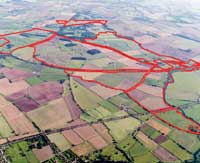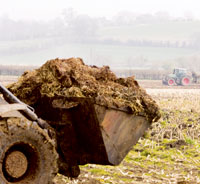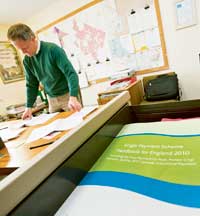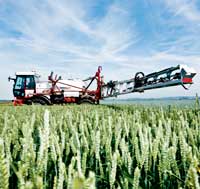Barometer farmers: Which red tape to rip up

Anything from a necessary evil to an utter nightmare is how six of Farmers Weekly’s regional arable representatives regard the red tape surrounding them.
Most legislation, for example on drink-driving, is intended to protect the majority from the actions of the few, and that affecting farmers is no exception, says Ben Atkinson in Lincolnshire.
“All industry is under pressure to record and report on many areas, from Health and Safety to environmental plans. Yes, it’s a hassle, but most policies actually make sense.
“Most farmers are very conscientious in every way, but a few are not.
“Agriculture is no different, although some still think it is. We should stop whinging, and channel the time, effort and expense into making the process easier, not fighting it.”
However Andy Barr, in Kent, is less accommodating, and Lincolnshire’s Tony Reynolds says the combination of government-imposed rules and various assurance scheme requirements at times make him “lose the will to live, let alone farm”.
According to Mr Barr the biggest waste of time and money for farmers, the government and the public is the complex made up of the Single Farm Payment, cross compliance, Rural Land Registary mapping, environmental stewardship schemes and the Campaign for the Farmed Environment.
 “The amount of taxpayers’ money and farmers’ time it cost to sort out the recent mind-blowingly ridiculous digital re-mapping is frightening.
“The amount of taxpayers’ money and farmers’ time it cost to sort out the recent mind-blowingly ridiculous digital re-mapping is frightening.
“We cannot keep bending over backwards to keep the EU happy when it’s costing our country money we don’t have. I continue to receive letters telling me my field areas have been altered by 0.01ha. It’s sheer madness.”
Filling in and processing SFP forms and inspection or compliance is incredibly costly, wastes time and creates undeserved stress, he says.
“We need to avoid any further inefficient mapping exercises and long form-filling and data-inputting. Now that we have this field data don’t let’s get ourselves bullied into re-doing it by the EU, but use it.”
Each farmer could make a simple internet return (avoiding Rural Payments Agency staff inputting) identifying the field numbers they farm and pinpointing those in environmental production, he suggests.
“There should be a simple check that environmental production fields are not being claimed twice by different people. All subsidies would then be at a flat rate for those fields and vary only with the exchange rate.
“Forget all stewardship schemes, CFE and cross compliance. Just say that to get your subsidy payment you must have X% of your land managed solely for environmental purposes and Y% in spring cropping.
“Simply provide the numbers of the fields in question to claim the money and someone in an office can then check them by satellite imagery.”
Farmers with highly productive land could pay those on poorer soils to take on their cross compliance areas, he adds. “This would ensure food production is maximised.”
Mr Reynolds is less critical of the SFP system.
“With maps, field sizes and pre-populations corrected, submission online makes it a considerably easier and more straightforward task than in the past. As recipients of public-purse monies we must accept the requirement for auditable forms.
“The red tape that consumes most time seems caused by the inability of one regulation-setter to appreciate the work done by the next.”
 There are clearly overlapping areas, on buffer strips for example, within LERAPs (Local Environment Risk Assessments for Pesticides), Nitrate Vulnerable Zones, cross compliance, Entry Level Strewardship, Higher Level Stewardship and the Campaign for the Farmed Environment, he points out.
There are clearly overlapping areas, on buffer strips for example, within LERAPs (Local Environment Risk Assessments for Pesticides), Nitrate Vulnerable Zones, cross compliance, Entry Level Strewardship, Higher Level Stewardship and the Campaign for the Farmed Environment, he points out.
Other red-tape examples include the June return, “the purpose of which is outdated”, the Survey of Hours and Earnings “for which we have been randomly selected every year for the past 20”, and the Survey of Farming Practices “which seems to consist of information required that is already included elsewhere”. “And the rules for Catchment Sensitive Farming overlie all previous red tape.
“My plea is that there should be co-operation between the holders of information, ie us, and those requiring statistics for whatever purpose.” The reason for any new red tape must be clearly identified and matched by removing anything outdated, he stresses.
Call for single audit scheme
Alastair Home-Roberts, farming in Shropshire, believes the June census, cross compliance and Assured Combinable Crops Scheme (ACCS) should be combined.
“There must be a way of rolling all these into one scheme or audit and putting the Soil Protection Review and HSE audit into it too.
“NVZs are tricky as some of our land is in a zone and some out. Would it not be easier just to have a blanket N maximum and average N across the whole country?”
Cross compliance has effectively been rubbished by three seasons of harvesting derogations, argues Mr Home-Roberts. “Surely they must realise farmers won’t harvest in difficult conditions unless absolutely essential?
“The main problem is cross-checking everything so that you know that you’ve done everything for all the different schemes. Cross compliance isn’t too bad if you are all cereals, but if you have a mixture of crops and animals it must be a nightmare.
“On the whole the industry is very responsible, but we need regulation to keep on top the minority who give us a bad name.”
Given government spending constraints he hopes DEFRA may cut the petty red tape that costs more than to police than it is worth in environmental benefit, and will streamline cross compliance, ACCS and the various stewardship schemes into one annual audit.
“Reduce the number of staff and spend the money on encouraging more environmental schemes,” he urges.
“I’m not really sure what the Campaign for the Farmed Environment is trying to achieve when there are perfectly good ELS, OELS and HLS schemes already in place. It just seems another load of paperwork.”
Customers call the tune
If a customer, of which the Treasury is one, dictates something and is willing to pay for it, then it should be accepted, argues Mr Atkinson.
“NVZs and cross compliance are both protective, but workable, measures. If we abide by them and prove that we are doing so, then they will always be workable.”
 Record-keeping and red tape are inevitable parts of modern life, says Dorset’s Peter Snell. “They’re born fundamentally from the fact that we live in a grossly over-populated world. Farmers accept the burden but just want it to be proportional and minimised and, above all, to avoid duplication and time wasting.
Record-keeping and red tape are inevitable parts of modern life, says Dorset’s Peter Snell. “They’re born fundamentally from the fact that we live in a grossly over-populated world. Farmers accept the burden but just want it to be proportional and minimised and, above all, to avoid duplication and time wasting.
“As an industry we should lead the way in proving the provenance and quality of the grains we sell. So I have no problem in facing up to and meeting assurance standards and inspections.
“However I do begrudge the fact is that it is still easy, with a little discount, to sell non-assured grain. This is double standards, as is importing bulk commodities, be it soya for animal feed or high-protein wheat for bread-making, that don’t undergo a fraction of the scrutiny that ours do.”
However, in Essex, Peter Wombwell describes the ACCS as “a particular bugbear.
“I dislike the fact that the scheme is technically voluntary, but you can’t sell your grain without being a member of ACCS. I have to spend a considerable amount of time and money preparing for inspection and making sure computer records are up to date and accurate.
“The annual subscription isn’t cheap, and I end up spending more money, for example employing a pest control contractor to make sure I comply with the scheme’s requirements. Yet the costs incurred don’t guarantee a penny more on the price of my grain or livestock.”
However, Mr Barr counters, ” I have no problems with assurance schemes and believe they will be increasingly led by the market and not government.”
Pesticide posers
 Mr Snell claims the red tape surrounding pesticide use is a “legislation nightmare.”
Mr Snell claims the red tape surrounding pesticide use is a “legislation nightmare.”
“While I agree that farmers must be competent and comply with spraying rules there are some that just don’t make sense.
“They mean, for example, that to apply more than one stale seed-bed glyphosate spray you have to switch brands, yet the active ingredients are identical.
“It’s a similar scenario when applying full-rate chlormequat to winter wheat – you have to change brands.
“And when targeting grassweeds in oilseed rape, you have to ensure that the reason you give for your graminicide application differs between sprays – in other words the first being for volunteer cereals and the second for blackgrass.”
Paper problems
Most paper exercises start out as reasonable ideas, says Mr Wombwell.
“But they always seem to become complicated, unwieldy and time-consuming while delivering little of practical benefit to farmers.
“The annual census seems to be a way of gathering information to used against the farming industry.
“The annual single farm payment is a nightmare with endless mistakes, changes, wrong maps, changed maps, phone calls etc. We’ve resorted to employing an agent to deal with the claim as they have more time and expertise – but of course this doesn’t come cheap.”
Rip up Red Tape
 A government taskforce wants farmers to help it lift the burden of red tape from the industry by telling it which agricultural legislation they would like abolished. Farmers Weekly is urging growers, through the Rip Up Red Tape campaign, to respond to the consultation document and put forward their solutions for the current bureaucratic nightmare.
A government taskforce wants farmers to help it lift the burden of red tape from the industry by telling it which agricultural legislation they would like abolished. Farmers Weekly is urging growers, through the Rip Up Red Tape campaign, to respond to the consultation document and put forward their solutions for the current bureaucratic nightmare.
• For more information, go to our Rip Up Red Tape page

